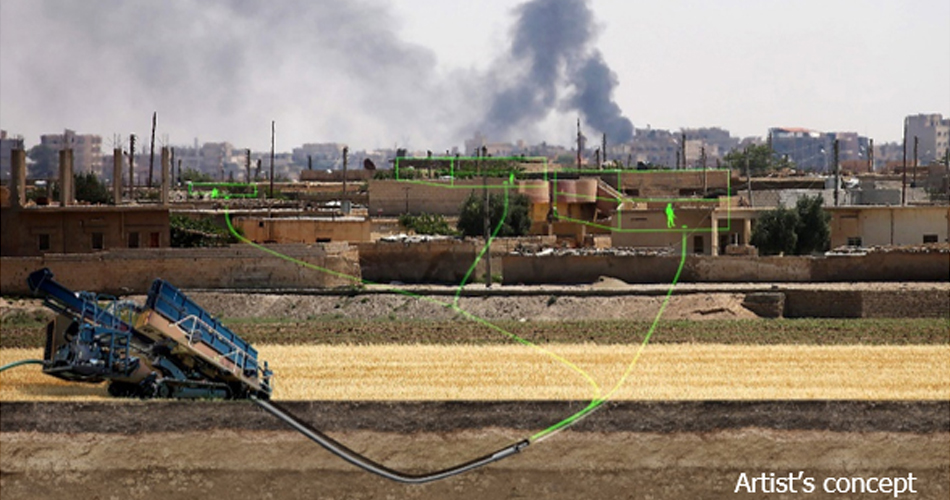GE’s Enormous Earthworm Robot has the capability to dig giant tunnels underground. Barely any dirt, small stones, or impediments could stop the massive earthworm robot from digging to its ultimate destination on an underground road in GE’s Research Campus in Niskayuna.
Defense Advanced Research Projects Agency (DARPA) has funded $ 2.5 million to the Robotics team of GE Research for its Underminer program. GE Research’s Robotics team successfully demonstrated the viability of its bio-inspiring soft-robotic project design for fast and efficient digging of the tunnel over a year and a half by the Earthworm Robot.
The GE Research Robotics team is tunneling its way to success with a giant earthworm robot. The bio-inspired soft robot design demonstrated the ability to operate in extreme, rugged environments through a $2.5M project funded by @DARPA's Underminer program https://t.co/KJUCROY1jm
— GE Research (@GEResearch) July 8, 2021
The Underminer program aims to show that tactical tunnel networks can be constructed quickly, allowing a safe and responsive resupply. A tactical tunnel network could offer a secure logistics support infrastructure, like pre-positioning supplies before an operation, or provide ongoing resupply as troops move over an area. The capacity to swiftly bore tactical tunnels could assist in contingency operations like fast ammunition resupply or rescue missions.
Presently, no Military Defense Department covers the development or operation of tactical tunnels; current tunneling operations rely primarily on bores and above-ground guidance beacons. Underminer aims to create aggressive tunneling, detection, and operation approaches that exceed these restrictions and incorporate commercial sector capacity, including oil and gas, public utilities, geology, environment, and other sectors.
GE Researchers, headed by Deepak Trivedi, constructed and exhibited a prototype independently and continuously tunneled underground at GE’s Research campus in Niskayuna, New York, at a relative distance to existing, commercially accessible, trenchless technology. The GE soft robot design was incredibly skillful with the artificial fluid muscles while traveling, as it sculpted a 10 cm tunnel and managed to slide past minor stones and obstructions.
Trenchless technology is a sort of underground construction that uses modern techniques and technology, without causing interruption, to construct and upgrade underground infrastructure.
Deepak Trivedi, a mechanical engineer at GE Research, says,
“Through this project, we have truly broken new ground in advancing autonomous and soft robotic designs.”
He also added that by creating a fully functional autonomous mini bot that can navigate extreme turning radiuses and operate reliably through rugged environments, we are now opening a whole new world of possibilities beyond existing commercial technologies.
The fundamental idea of soft robotics is to develop robots with far more mobility than traditional robots with limbs. Lacking joints or limbs, soft robots have the potential to perform sharp turns, slide through small, restricted areas, and even capture and move things of varied forms or sizes. The GE research experts took inspiration from the most proficient tunnel digger for this program, i.e., Earthworms.
GE Research collaborated with its partner InnoVital Systems to develop its enormous earthworm robot. InnoVital Systems is an innovative defense and health technology organization. InnoVital Systems devised and delivered pneumatic muscles embedded in the soft robot design of the Earthworm robot. These muscles imitate the muscles of earthworms and their function. The scale and pressure capacity exceeded the latest capabilities during the tests, which are essential to reach better levels of robustness and performance in harsh environmental conditions.
Trivedi claims that the technologies produced for this program will contribute to furthering tunneling technology and advanced inspections and repairs with robots. Snakelike robots for jet engine inspections and repairs have already been designed and tested by GE.
Trivedi also states that GE Research Experts want to conduct more profound, in-situ inspection and repair capability to enable more continuous inspection and repair in the future. Also, permit inspection and reparation of significant energy generating equipment such as gas and steam turbines without abandonment of services for long durations.

